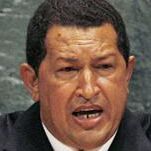
Iran-Venezuela Agree on Joint Oil Exploration
Iranian President Mahmoud Ahmadinejad signed 29 agreements with his Venezuelan counterpart during an official state visit to Venezuela on September 17-18. One of those agreements was a joint exploration deal for the Orinoco basin, which is thought to contain 230 billion barrels of extra-heavy tar-like oil.
The official state visit and the agreements were intended to strengthen these two nations’ alliance to “drive forward both revolutions,” according to Hugo Chavez.
Venezuela’s state-owned oil company, pdvsa, and Iran’s Petropars will undertake the Orinoco basin project.
With oil prices so high, any increase in Venezuela’s oil production will give it considerable influence in a region largely ignored by the United States. It would obviously take some time for the project to become profitable, but Venezuela also wants to send a message to the U.S.
“We’ve teamed up to work and combat for a multi-polar world. This is a historic event,” said Mr. Chavez. What Chavez is saying isn’t anything new, but now he is backing up his words with action.
If the anticipated amounts of oil are confirmed in 2008, Venezuela could become the country with the greatest oil reserves in the world. Even if not, Venezuela’s continual support for Iran is a major irritant for the U.S. as it tries to internationally isolate Iran.
Chavez said Venezuela is “united now and forever with the Iranian revolution, which has proved to the world that it has become the fuel for revolution.”
The increased oil supply would energize Venezuela’s oil diplomacy, increasing the problems Venezuela is already causing for the U.S. in its own backyard. Chavez‘s support for Sandinista Daniel Ortega, which included giving Nicaragua 200,000 gallons of diesel, has helped launch Ortega to the forefront of Nicaragua’s presidential race. Ortega led the Sandinista National Liberation Front in a Communist revolt that overthrew U.S.-backed Anastasio Somoza in 1979.
Chavez may not be the threat to the U.S. he wishes to be yet, but he is certainly a thorn in its side—a thorn it can’t ignore for much longer. That the U.S. couldn’t block Venezuela’s deal with Iran, or effectively counter Chavez’s oil diplomacy in Nicaragua, may show that it’s too late for America to contain Chavez as he continues to build anti-American, anti-democratic alliances around the world.
